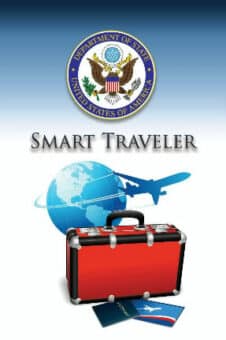by Roger Mason
 Introduction
Introduction
Summer will be here soon. Individuals, families, professionals, students, and academics will be traveling around the world. International travel has never been easier. One of the best parts of my job is traveling. I have been to some incredible places and met some very interesting people. As tempting as travel is it is important to realize there are real risks to persons traveling. The possibility of risks and hazards is especially true for travel outside the US.
In the past twenty years terrorists have targeted tourists and popular travel destinations. If a person takes reasonable precautions, they can improve their chances of avoiding a travel emergency. I have 40 years of travel for pleasure, work, and the military. The following comments are my recommendations for travel safety.
Getting Ready
Getting ready means doing your homework and taking care of safety issues before you depart.
US State Department
US citizens should check the State Department’s travel website for travel advisories. This should be followed up by a Google search of where you are going. You can learn information related to unsafe conditions or locations you may need to avoid. Get your passport ahead of time. Expedited passports are possible but very expensive. If you have a passport always check to make sure it is current.

TSA has a Trusted Traveler Program. There are two types of trusted traveler programs.
TSA Pre Check allows you to avoid long lines at the airport and many of the regulations like removing your laptop. TSA Global Entry allows you to bypass the customs lines when returning to the US. Both require you to submit an application and have an interview at a TSA office. Most of them are at airports where TSA has offices. You must make an appointment and sometimes there is a wait so plan ahead.
Medical Insurance
You check the policy of your health insurance company for overseas travel. Be sure you have the number to call if you need to get treatment approved. If your provider does not cover you some companies will insure you while traveling outside the US.
Credit/Bank Cards
Call your credit card companies and your bank. (The numbers are on the back of the cards). Tell them when you are traveling and where you will be. I had the unfortunate experience of going to an ATM in Jerusalem to discover that my bank assumed my card had been stolen. They did not know I was traveling overseas and shut the card off.
Get Money
ATMs are plentiful and getting money overseas is not difficult. Check to see which foreign banks have reciprocal agreements with your bank, so you do not get slammed with expensive ATM fees. If I’m going to Europe, I order some Euros from my local branch. It will take about 3-4 days to get. When you arrive you have cash on hand in case you need it.
Have a Spending Plan
There are several excellent travel sites that list what you should spend for basic services like cab fare or average dinner prices. I like to look at the websites of the museums to see what entry costs. This is prevent being surprised and suddenly broke.
Gather Intelligence
One of the best ways to keep your trip safe is to talk to associates who have been to the location. They can tell you what not to miss and what to avoid. I always read the reviews of the hotel.
Have a “Flight Plan”
The FAA defines a flight plan as “a document filed by a pilot, before departure, indicating the flight path and destination.” You should have a “flight plan” that lists your itinerary and where you will be staying. Someone at home needs to have a copy.
Serious issues of personal travel safety have replaced arriving in a foreign country and causally touring as you see fit. Somebody at home should know where you are going. If you decide to change hotels or your itinerary your person at home needs to know.
 Communications
Communications
You should not assume that how you communicate at home will be the same when you are traveling.
Cell phones
You need to do some research to learn how your cell phone will work overseas. You should also check to see what your provider charges for overseas use.
Local phone calls
Learn what you need to make a local phone with your cell phone.
Ready access card
Have a ready access card in your wallet with all of your important numbers including the US Embassy/consulate, and your hotel.
Have a communications plan
You should have a regular communications plan for checking in with your contact at home. This should be a predetermined date or time to check in. You should have an emergency communications plan for members of your party. During an emergency you should have a plan for when you will call each other. Instead of continually calling you can set a time to reconnect. This can be helpful especially if your cell phone battery is dying.
Emergency Communications
The US State Department has a website called 911 Abroad. It will tell you the three-digit emergency code for any country you are visiting. If you are in the UK and you pick up a phone and dial 911 nothing will happen.
Know Where You Are Going
One of the most important things is to study a map and get a basic feel for the places you will be visiting. This provides a measure of safety as you will be able to judge distances and directions.

Memorize the name and address of your hotel(s)
Places you will visit
Study your map, so you know how to travel from one destination to another.
Safety locations
You should know the locations of the US Embassy/consulate, police station, and hospital.
Personal Safety
There are some personal safety points which will help to protect you.
Local transportation
Be very careful with local transportation. If you are at your hotel have them call a cab. If you use public transportation be cautious. Pick pockets are attracted to crowds.
Rally point
Have predesignated rally points for contingencies. Rally points are places you flee to for safety and to meet up with your fellow travelers. (Ex: During an emergency if we become separated we will meet 100’ from the front entrance of the location.)
Keeping your distance
People naturally like to converse with foreigners. Be polite but careful about the information you share with strangers. Do not tell them what hotel you are staying in. Do not accept rides or other offers from strangers.
Keeping alert
You have to be alert to avoid being a victim. Being alert is watching what is happening around you. If you are in crowded location stay near the exits. Always look to see how you will get out if there is an emergency. I look at the crowd and see who is watching. They are usually the police or bad guys. Stay away from them.

You will probably be in contact with local police. I would also call the nearest US Embassy. There are FBI agents assigned as local liaison officers at every US Embassy. They can help you with problems and provide advice.
What to Carry/Wear
Here are some tips for what to carry and wear.
Street guide
Carry a small tourist street guide.
Emergency cash
You should have some local currency that you keep in your wallet for emergencies.
Tactical Flashlight
Find a small flashlight that will fit in comfortably in your pocket or purse. If you are in a building during the emergency and the power goes out the light can save your life. Don’t rely on your cell phone light. You will need to save the battery.
Battery
Carry a small pocket battery so you can recharge your cell phone.
Pen
Always carry a writing device. A clickable ballpoint pen is best. You may need to write down information like which hospital your roommate was taken to.
ID
Most hotels provide for a safe in your room. I usually keep my passport in the safe and carry a photocopy. Stored on my cell phone is a photograph of my driver’s license and passport.
Shoes
When you are traveling, I recommend wearing shoes you can run in. If you look at photos or videos of emergencies people are often running for their lives. You need shoes that will allow you a chance to escape.
Summary
The number one safety tip I tell family and friends is always travel “bulletproof.” Do not rely on daily conveniences to ensure your personal safety. Something that is bulletproof will never fail. People tell me they do not need to worry about carrying a small flashlight or memorizing where the hotel is because they have the latest IPhone. That does not take into consideration that cell phones fail and batteries go dead. Some people base their travel safety on a best case scenario. My personal experiences indicate everyone needs a travel emergency plan. Hoping things will work out is no plan. By taking a few precautions, you can improve your safety while traveling.

 Introduction
Introduction Communications
Communications